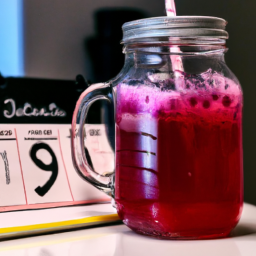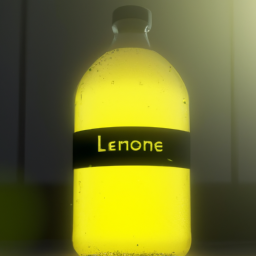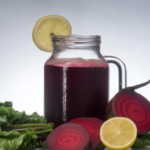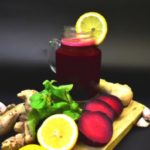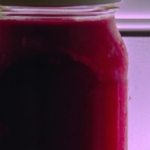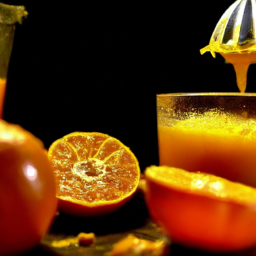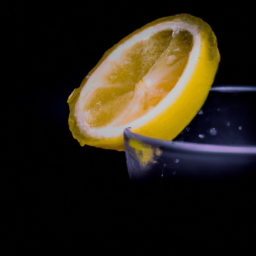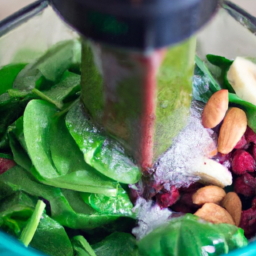Lately, I received a bottle of beet juice as a present, and I was excited to try it. As I savored the sweet yet earthy taste of the drink, it sparked my curiosity to learn, how long does beet juice stay fresh?
As someone who loves to juice and drink fresh vegetable juices, I knew that the shelf life of juices can vary greatly depending on a variety of factors. If you’re like me and enjoy drinking beet juice for its numerous health benefits, it’s important to know how to properly store it and when to toss it out.
In this article, we’ll explore the nutritional benefits of beet juice and the factors that affect its shelf life. We’ll also discuss the best practices for storing both freshly juiced and store-bought beet juice, how to identify signs of spoiled juice, and how to maximize the nutritional benefits of your beet juice.
Key Takeaways
- Freshly juiced beet juice is at its peak in taste and nutritional value when consumed immediately after juicing.
- Beet juice can last up to 3 days in an airtight container in the fridge.
- Glass or airtight plastic containers are recommended for storage to prevent contamination and preserve quality.
- Spoiled beet juice can cause foodborne illness and should be disposed of properly for hygiene and environmental impact.
Nutritional Benefits of Beet Juice
You’ll love the nutritional benefits of beet juice – it’s packed with vitamins and minerals that can improve your health. Beet juice recipes have become increasingly popular in recent years due to its numerous health benefits.
It contains high levels of vitamin C, iron, magnesium, and potassium, all of which are essential nutrients for maintaining good health. Research has shown that drinking beet juice can help lower blood pressure, improve circulation, and increase exercise endurance.
The nitrates found in beets help to relax blood vessels, allowing for better blood flow and oxygen delivery to the body’s tissues. With its many health benefits, it’s no wonder that beet juice has become a popular addition to many people’s diets.
However, it’s important to know how long beet juice lasts to ensure that you are consuming it at its freshest.
Factors Affecting the Shelf Life of Beet Juice
If you store it properly, your beet juice will stay fresh for a decent amount of time. However, there are several factors that can affect the taste and color of the juice. These factors include exposure to light, air, temperature, and bacteria.
To maintain the freshness of your beet juice, it is important to store it in an airtight container, preferably a glass bottle, and keep it refrigerated. Additionally, you can add lemon juice to the beet juice to help preserve its color and flavor. It is also recommended to consume the beet juice within 3-4 days of making it to ensure maximum freshness and nutritional benefits.
Moving on to freshly juiced beet juice, it is important to note that the taste and nutritional value of the juice is at its peak when consumed immediately after juicing.
Freshly Juiced Beet Juice
When I make freshly juiced beet juice, I’m always curious about its shelf life and nutritional value.
From my experience, freshly juiced beet juice can last for up to 3 days when stored in an airtight container in the refrigerator.
Additionally, it’s important to note that the longer the juice sits, the more its nutritional value may decrease.
Shelf Life
Typically, beet juice lasts for about 2-3 days in the fridge before it starts to spoil. However, this can vary based on how the juice is stored and how fresh the beets were before juicing.
To extend the shelf life of beet juice, it’s important to properly store it. This means keeping it in an airtight container, such as a glass jar, and placing it in the refrigerator as soon as possible after juicing.
Preserving the freshness of beet juice is important not only for taste but also for nutritional value. Beet juice is packed with nutrients such as vitamins A and C, potassium, and iron. These nutrients can start to degrade as soon as the juice is exposed to light, air, and heat.
This is why it’s recommended to drink beet juice as soon as possible after juicing, or within 2-3 days if stored properly. In the next section, we’ll discuss more about the nutritional value of beet juice and why it’s such a healthy choice.
Nutritional Value
Understanding the impressive range of nutrients found in beet juice can help you make an informed decision about incorporating it into your daily diet. Here are three key nutritional benefits of beet juice:
-
High in antioxidants: Beet juice is rich in compounds such as betalains and flavonoids, which help protect your cells from damage caused by free radicals.
-
Good source of vitamins and minerals: Beet juice contains a variety of vitamins and minerals, including vitamin C, folate, potassium, and iron, which are essential for maintaining good health.
-
May lower blood pressure: Studies have shown that drinking beet juice may help lower blood pressure, which can reduce your risk of heart disease and stroke.
If you’re looking for new juice recipes to add to your diet, beet juice is a great option. Not only is it packed with essential nutrients, but it also has a variety of health benefits.
However, to ensure you get the most out of your beet juice, it’s important to store it properly.
Let’s explore the best practices for storing fresh beet juice in the next section.
Best Practices for Storing Fresh Beet Juice
To keep your fresh beet juice tasting its best, make sure to store it in the refrigerator and use it within 3-5 days. Juice preservation is important to maintain its nutritional value and taste. It is recommended to use glass containers or airtight plastic containers to store your beet juice. This helps to prevent any contamination and preserve the quality of the juice.
Here’s a helpful table to summarize the best practices for storing fresh beet juice:
| Storage Container | Refrigerator Shelf Life | Freezer Shelf Life |
|---|---|---|
| Glass Jar | 3-5 days | Up to 6 months |
| Airtight Plastic Container | 3-5 days | Up to 3 months |
| Ice Cube Tray | N/A | Up to 6 months |
Don’t hesitate to freeze any leftover juice into ice cubes for later use! In the next section, we’ll discuss how long store-bought beet juice lasts.
Store-Bought Beet Juice
When it comes to store-bought beet juice, there are a few key points to consider. First, it’s important to check the expiration date and make sure the juice is still within its shelf life.
Second, it’s important to note that some store-bought beet juices may have added sugars or other ingredients that can affect the nutritional value.
Finally, it’s always a good idea to read the label and make sure you’re getting a high-quality, pure beet juice with all the nutrients intact.
Shelf Life
Hey, did you know that if you don’t store your beet juice properly, it could go bad in just a few days? Fortunately, there are ways to extend its shelf life and preserve its freshness.
The first thing you should do is keep it refrigerated at all times. This will slow down the oxidation process and prevent the growth of bacteria that can spoil the juice.
Another way to extend the shelf life of your beet juice is to add a natural preservative, such as lemon juice or apple cider vinegar. These ingredients will help to prevent the growth of harmful bacteria and fungi, and keep your juice fresher for longer.
Keep in mind that even with these measures, your beet juice will only last for a few days in the refrigerator. So, it’s best to make small batches and consume them within a day or two to ensure maximum nutritional value.
Nutritional Value
The nutritional benefits of beet juice are simply unbeatable. Not only is it a great source of vitamins and minerals, but it can also help improve athletic performance and lower blood pressure. Here are some of the health benefits of drinking beet juice:
-
Improves digestive health: Beet juice contains fiber that aids in digestion and promotes regular bowel movements.
-
Boosts immunity: The high concentration of vitamin C in beet juice can help strengthen the immune system and protect against illnesses.
-
Reduces inflammation: Beet juice contains anti-inflammatory compounds that can help reduce inflammation in the body and prevent chronic diseases.
If you’re looking to incorporate beet juice into your diet, there are plenty of delicious recipes to try. From simple blends with other fruits and vegetables to more complex smoothies with added protein powder, the options are endless. Just be sure to store your beet juice properly to ensure it stays fresh and retains its nutritional value.
Next, let’s explore some best practices for storing store-bought beet juice.
Best Practices for Storing Store-Bought Beet Juice
To make sure your store-bought beet juice lasts as long as possible, you’ll want to store it in the refrigerator. The ideal temperature range for storing beet juice is between 32-40°F. This will help slow down the growth of bacteria and preserve the nutritional value of the juice.
It is important to store the juice in airtight containers to prevent oxidation and contamination. When storing the beet juice, it’s also advisable to consume it within 3-4 days of opening the container. This is because the juice can spoil quickly once exposed to air.
If the juice has an off-putting odor, a slimy texture, or a sour taste, it may have spoiled and should be discarded. Proper storage is key to ensuring that your store-bought beet juice stays fresh and healthy for consumption.
Signs of Spoiled Beet Juice
You can easily tell if your store-bought beet juice has spoiled by checking for off-putting odors, slimy textures, or sour tastes. If the juice smells rancid or has a strong, unpleasant odor, it’s likely no longer safe to consume.
Additionally, if the texture of the juice appears slimy or there are visible mold or yeast growths, it’s best to discard the juice immediately.
Finally, if the juice tastes sour or off, it’s likely that it has gone bad and should be avoided.
To prevent spoilage of your store-bought beet juice, it’s best to store it properly in the refrigerator and consume it within the expiration date listed on the bottle. Additionally, it’s important to avoid leaving the juice at room temperature for extended periods of time.
Consuming spoiled beet juice can lead to foodborne illness, which can cause symptoms such as nausea, vomiting, diarrhea, and abdominal pain. It’s important to be vigilant and check the juice for any signs of spoilage before consuming it.
Proper disposal of spoiled beet juice is important to avoid any potential harm to others and the environment.
Proper Disposal of Spoiled Beet Juice
If you’re ever in doubt about what to do with your spoiled beet juice, just remember the old saying: ‘When in doubt, throw it out.’
Proper disposal of spoiled beet juice is important not only for hygiene reasons, but also for environmental impact.
There are several disposal methods available, depending on your location and available resources. One option is to pour the spoiled beet juice down the drain, but this may not be the most eco-friendly choice.
Beet juice contains high levels of nitrates and other minerals that can be harmful to aquatic life if they end up in bodies of water. Another option is to dispose of the juice in your compost bin or landfill.
However, it’s important to note that the high sugar content of beet juice can attract pests and rodents if not properly covered or contained. To minimize the environmental impact, it’s recommended to pour the juice into a sealable container and dispose of it in the trash.
Tips for Maximizing Nutritional Benefits
Now that we know how to properly dispose of spoiled beet juice, let’s talk about how we can get the most nutritional benefits out of fresh beet juice.
Juicing is an excellent way to consume beets, as it allows us to extract all the nutrients from the vegetable. However, not all juicing techniques are created equal. To maximize the nutritional benefits, it’s essential to use the right juicing technique.
One of the most effective juicing techniques is cold-pressed juicing. This method involves slowly pressing the beets to extract the juice, which helps to retain all the nutrients and enzymes.
Another technique is to blend the beets with other fruits and vegetables to create a tasty and nutritious juice. Some popular beet juice recipes include adding apples, carrots, and ginger to the mix. Incorporating these ingredients not only enhances the flavor but also provides additional nutritional benefits.
To reap the full benefits of beet juice, it’s essential to experiment with different juicing techniques and recipes until you find what works best for you.
Frequently Asked Questions
Can you freeze beet juice to extend its shelf life?
Yes, freezing beet juice is a preservation method that can extend its shelf life. Simply pour the juice into an airtight container, leaving some room for expansion, and freeze. Thaw in the fridge before drinking.
How long does beet juice last when mixed with other fruits or vegetables?
Mixing beet juice with other fruits or vegetables can increase its nutritional value. However, storing it for too long can lead to spoilage and loss of nutrients. Best ways to store beet juice when mixed include refrigeration in an air-tight container for up to 72 hours.
Can you drink beet juice past its expiration date?
Drinking expired beet juice is not recommended as it can cause food poisoning. However, there are alternative ways to use it such as in DIY beauty products or as a natural dye. To store beet juice, refrigerate it in an airtight container for up to 3-4 days.
Is it safe to consume beet juice that has changed color or has a different texture?
When beet juice changes color or texture, it’s best to avoid consuming it due to safety concerns. Regular consumption of beet juice can offer potential health benefits, but also comes with potential risks.
How often should you drink beet juice to reap its health benefits?
To reap health benefits from beet juice, I drink it twice a week. Beet juice frequency depends on individual needs, but it’s important to not overdo it as excess consumption can cause health issues.
Conclusion
So there you have it, folks! Beet juice is a nutritious and delicious beverage that can provide a variety of health benefits. Whether you’re juicing your own beets or buying pre-made juice at the store, it’s important to store it properly to ensure it stays fresh for as long as possible.
By following the best practices outlined in this article, you can enjoy the benefits of beet juice for weeks to come. As the saying goes, "an apple a day keeps the doctor away,"but perhaps we should add "a glass of beet juice a day keeps the ailments at bay"to that list.
With its high levels of vitamins, minerals, and antioxidants, beet juice is a powerful tool in the fight against inflammation, high blood pressure, and other health issues. So go ahead and enjoy your beet juice knowing that you’re doing your body a world of good!
Ilana has been a vegan for over 10 years. She originally made the switch for health reasons, but soon found herself becoming more and more passionate about the ethical and environmental implications of a vegan lifestyle. Ilana is the author of The Graceful Kitchen, a blog all about veganism. She loves to cook up delicious and nutritious vegan meals, and share her recipes with others who are interested in leading a cruelty-free life. Ilana is also a strong advocate for using whole foods as the foundation of a healthy diet, and believes that going vegan is one of the best ways to achieve this.
